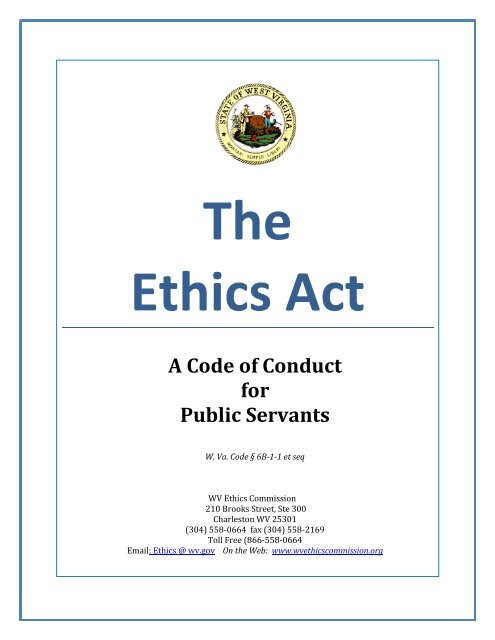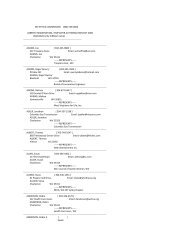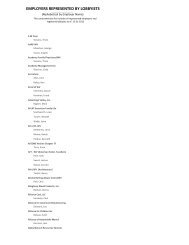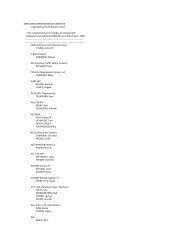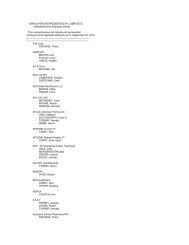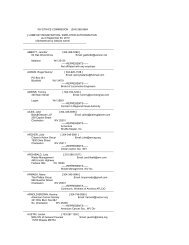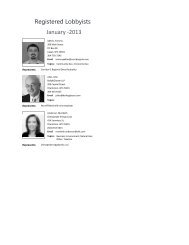The Ethics Act - A Code of Conduct for Public Servants
The Ethics Act - A Code of Conduct for Public Servants
The Ethics Act - A Code of Conduct for Public Servants
Create successful ePaper yourself
Turn your PDF publications into a flip-book with our unique Google optimized e-Paper software.
<strong>The</strong><br />
<strong>Ethics</strong> <strong>Act</strong><br />
A <strong>Code</strong> <strong>of</strong> <strong>Conduct</strong><br />
<strong>for</strong><br />
<strong>Public</strong> <strong>Servants</strong><br />
W. Va. <strong>Code</strong> § 6B-1-1 et seq<br />
WV <strong>Ethics</strong> Commission<br />
210 Brooks Street, Ste 300<br />
Charleston WV 25301<br />
(304) 558-0664 fax (304) 558-2169<br />
Toll Free (866-558-0664<br />
Email: <strong>Ethics</strong> @ wv.gov On the Web: www.wvethicscommission.org
What is the <strong>Ethics</strong> <strong>Act</strong>?<br />
<strong>The</strong> West Virginia Governmental <strong>Ethics</strong> <strong>Act</strong> established a code <strong>of</strong> conduct to guide public<br />
<strong>of</strong>ficials and public employees and help them avoid conflicts between their personal interests and their<br />
public responsibilities.<br />
<strong>The</strong> <strong>Ethics</strong> <strong>Act</strong> tells public servants what is expected <strong>of</strong> them and gives <strong>of</strong>ficial approval to<br />
their conduct if it complies with the standards <strong>of</strong> the <strong>Act</strong>.<br />
Who is covered by the <strong>Act</strong>?<br />
<strong>The</strong> code <strong>of</strong> conduct established by the <strong>Act</strong> applies to all public servants (public employees,<br />
elected public <strong>of</strong>ficials, and appointed public <strong>of</strong>ficials) full-time and part-time, who serve in the<br />
legislative, judicial, and executive branches <strong>of</strong> state, county, and municipal governments and the<br />
boards, commissions and the agencies <strong>of</strong> each <strong>of</strong> those levels.<br />
What is the <strong>Ethics</strong> Commission?<br />
<strong>The</strong> West Virginia <strong>Ethics</strong> Commission was created to administer the <strong>Ethics</strong> <strong>Act</strong>. It is comprised<br />
<strong>of</strong> twelve part-time citizen members appointed by the Governor to serve five year terms. No more than<br />
seven <strong>of</strong> the Commission's members may be <strong>of</strong> the same political party. <strong>The</strong>ir appointments must be<br />
approved by the WV Senate. <strong>The</strong> Commission is supported by a small full-time staff.<br />
What does the Commission do?<br />
<strong>The</strong> <strong>Ethics</strong> Commission is responsible <strong>for</strong> educating and advising public servants and <strong>for</strong><br />
en<strong>for</strong>cing the <strong>Act</strong>.<br />
<strong>The</strong> primary responsibility <strong>of</strong> the Commission is to handle, in a confidential manner, questions<br />
from those covered by the <strong>Act</strong>. Most questions can be handled by the staff over the phone. 304-<br />
558-0664<br />
Some questions require consideration by the Commission at its regular monthly meeting. <strong>The</strong><br />
Commission answers these questions through written "Advisory Opinions."<br />
<strong>The</strong> WV <strong>Ethics</strong> Commission’s Committee on Open Governmental Meetings answers questions<br />
from governing bodies and their members, and provides advisory opinions on the meaning and<br />
application <strong>of</strong> the Open Meetings <strong>Act</strong> or “Sunshine Law”.<br />
<strong>The</strong> WV <strong>Ethics</strong> Commission’s Committee on Standards <strong>of</strong> <strong>Conduct</strong> <strong>for</strong> Administrative Law<br />
Judges answers questions from ALJs and provides advisory opinions to them regarding or interpreting<br />
the Rules on Standards <strong>of</strong> <strong>Conduct</strong>. It also considers complaints filed against ALJs.<br />
<strong>The</strong> <strong>Ethics</strong> Commission is also responsible <strong>for</strong> the registration and reporting <strong>of</strong> lobbyists and<br />
<strong>for</strong> the collection <strong>of</strong> financial disclosure reports.
Minimum Ethical Standards Established by the <strong>Act</strong><br />
Private Gain<br />
<strong>The</strong> basic principle underlying the standards and code <strong>of</strong> conduct created by the <strong>Ethics</strong> <strong>Act</strong> is<br />
that those in public service should use their positions <strong>for</strong> the public benefit and not <strong>for</strong> their own<br />
private gain or the private gain <strong>of</strong> another.<br />
For example:<br />
• You may not use your agency's supplies or equipment <strong>for</strong> personal projects or activities.<br />
• <strong>Public</strong> employees and full-time appointed <strong>of</strong>ficials may not work on personal projects or<br />
activities during work hours <strong>for</strong> which they are paid by their government employer.<br />
• You may not use subordinates to work on your personal projects or activities during work<br />
hours or compel them to do so on their own time.<br />
Gifts<br />
You may not solicit a gift unless it is <strong>for</strong> a charitable purpose from which you and your<br />
immediate family members derive no direct personal benefit. You may solicit political contributions,<br />
but should be aware <strong>of</strong> W. Va. <strong>Code</strong> § 3-8-12(h) which provides: “No person shall solicit any political<br />
contribution from any non-elective salaried employee <strong>of</strong> the state government or any <strong>of</strong> its<br />
subdivisions.” You may not solicit a subordinate <strong>for</strong> any gift, not even a gift <strong>for</strong> a charitable purpose.<br />
You may not accept gifts from lobbyists, or from interested persons, unless the gift fits into one<br />
<strong>of</strong> the following exceptions:<br />
• meals and beverages<br />
• unsolicited gifts <strong>of</strong> a value <strong>of</strong> $25 or less<br />
• ceremonial gifts or awards <strong>of</strong> trivial value<br />
• reasonable expenses incurred in appearing at a speaking engagement<br />
• reasonable honoraria<br />
• free tickets to political, charitable, or cultural events normally given as a courtesy to the<br />
<strong>of</strong>fice<br />
• purely private and personal gifts<br />
• lawful political contributions<br />
“Interested persons” are those who do or seek to do business with, are regulated by or are otherwise<br />
financially interested in the activities <strong>of</strong> your governmental agency.<br />
Selling to Subordinates<br />
Although they may choose to buy from you, you may not personally solicit (in person, by phone,<br />
or personal letter) private business from subordinates you direct, supervise or control. Solicitations<br />
directed to the public at large <strong>for</strong> sale <strong>of</strong> property which you are not regularly engaged in selling, are<br />
permitted.<br />
Voting*<br />
A public <strong>of</strong>ficial may not vote on a matter in which he or she, or an immediate family member,<br />
has a financial interest and may not vote on matters involving a business with which the public <strong>of</strong>ficial<br />
or an immediate family member is associated.<br />
NOTE: Legislative voting is governed by a separate provision in the <strong>Act</strong> that permits voting by<br />
Legislators after obtaining a ruling from the presiding <strong>of</strong>ficer in their chamber regarding any potential<br />
conflict situation.<br />
(*See Voting brochure <strong>for</strong> detailed in<strong>for</strong>mation.)
Private Interests in <strong>Public</strong> Contracts, Purchases & Sales<br />
You may not have a financial interest in any contract, purchase or sale over which your public<br />
position gives you control; nor may your spouse, your dependent parents or dependent children,<br />
unless the total value <strong>of</strong> the contracts, purchases or sales is less than $1,000 in a calendar year. This<br />
provision applies only to: (1) those contracts your job gives you authority to award or control, and<br />
(2) those purchases and sales you are authorized to make or direct others to make.<br />
<strong>The</strong> Commission has authority to grant your agency a hardship exemption from this provision <strong>of</strong><br />
the <strong>Ethics</strong> <strong>Act</strong>. NOTE: Part-time appointed <strong>of</strong>ficials (except those covered by W. Va. <strong>Code</strong> § 61-10-15)<br />
are not subject to this prohibition provided they recuse themselves from considering and acting on<br />
such matters consistent with the statute on voting.<br />
Licensing & Rate-Making<br />
You may not take <strong>of</strong>ficial action on a license or ratemaking matter affecting an entity in which<br />
you, or the members <strong>of</strong> your immediate family, own or control a 10% or greater interest. In addition,<br />
UNLESS you file a prior written public disclosure with your agency, you may not take <strong>of</strong>ficial action on a<br />
license or rate-making matter affecting a person to whom the entity in which you have an interest has<br />
sold goods or services totaling more than $1,000 during the preceding year.<br />
Moonlighting or Changing Jobs<br />
Full-time public servants may not: (1) seek employment with, (2) be employed by, or (3) seek<br />
to purchase from, or sell or lease real or personal property to any person or business:<br />
(a) that has a matter be<strong>for</strong>e the agency on which they are taking, or a subordinate is known to<br />
be taking, regulatory action, or<br />
(b) that had, within the preceding twelve months, a matter on which they took, or a subordinate<br />
is known to have taken, regulatory action.<br />
<strong>The</strong> <strong>Ethics</strong> Commission has authority to grant an exemption from this prohibition.<br />
Conflicts <strong>of</strong> Interest: Employment<br />
Full-time public servants may not take personal regulatory action on matters affecting a person<br />
(a) by whom they are secondarily employed, or<br />
(b) with whom they are seeking employment or have an agreement concerning future<br />
employment.<br />
Dual Compensation<br />
No public servant may receive compensation from two sources in state, county or municipal<br />
government <strong>for</strong> working the same hours, except under certain limited circumstances. Persons who are<br />
allowed to make up time missed with a governmental employer to per<strong>for</strong>m the duties <strong>of</strong> another<br />
governmental position are required to maintain specific time records. <strong>The</strong>ir governmental employer is<br />
required to submit these records to the <strong>Ethics</strong> Commission quarterly.<br />
Private Pay Prohibited<br />
Full-time public servants may not accept private pay <strong>for</strong> providing in<strong>for</strong>mation or services that<br />
are within the scope <strong>of</strong> their public duties. In other words, they cannot sell, even on their own time,<br />
services their public position requires them to provide. This applies only to private work <strong>for</strong> people or<br />
businesses served as part <strong>of</strong> their public duties.<br />
Note: Agencies may impose stricter rules <strong>of</strong> conduct in addition to those established by the<br />
WV Governmental <strong>Ethics</strong> <strong>Act</strong>.
<strong>The</strong>se Limitations Apply<br />
During and After Government Service<br />
Confidential In<strong>for</strong>mation: You may not, during or after government service, knowingly and<br />
improperly disclose confidential in<strong>for</strong>mation acquired through your public position, or use it to further<br />
the personal interests <strong>of</strong> yourself or another person.<br />
Prohibited Representation: <strong>The</strong> <strong>Ethics</strong> <strong>Act</strong> requires you to obtain your agency's consent<br />
be<strong>for</strong>e you represent a client in a matter in which you are or were substantially involved on behalf <strong>of</strong><br />
the agency. This applies both during and after your government service.<br />
<strong>The</strong> prohibition applies only to those matters in which you were personally involved in a<br />
decision making, advisory, or staff support capacity. It does not apply to legislators or legislative staff.<br />
Limitation on Practice: Certain public servants are prohibited from representing persons<br />
be<strong>for</strong>e their agency<br />
(1) while they are with the agency, and<br />
(2) <strong>for</strong> one year after leaving the agency.<br />
<strong>The</strong> prohibition applies only to elected and appointed public <strong>of</strong>ficials and full-time staff<br />
attorneys and accountants in agencies authorized to hear contested cases or make regulations.<br />
This prohibition applies to representation in contested cases, regulation filings, license or<br />
permit applications, rate-making proceedings and to influence the expenditure <strong>of</strong> public funds. It does<br />
not apply to legislators or legislative staff.<br />
<strong>The</strong> <strong>Ethics</strong> Commission has authority to grant an exemption from this prohibition.<br />
This Section Applies to County <strong>Public</strong> <strong>Servants</strong> Only<br />
Certain county personnel are also subject to a criminal statute which contains a similar, but<br />
more comprehensive public contract prohibition; W. Va. <strong>Code</strong> § 61-10-15 . <strong>The</strong> <strong>Ethics</strong> Commission is<br />
responsible <strong>for</strong> advising public servants about § 61-10-15 but has no role in its en<strong>for</strong>cement.<br />
W. Va. <strong>Code</strong> § 61-10-15 applies to:<br />
(1) elected county <strong>of</strong>ficials (such as sheriff, county commissioners and school board<br />
members),<br />
(2) appointed county <strong>of</strong>ficials (those who serve on county boards, commissions, authorities<br />
and agencies), and<br />
(3) public school superintendents, principals, and teachers. It does not apply to other<br />
county workers.<br />
§61-10-15 prohibits these designated county personnel from having personal financial interests,<br />
directly or indirectly, in a contract, purchase or sale over which their public position gives them "voice,<br />
influence or control." <strong>The</strong> prohibition extends to their spouses, those they support, and businesses in<br />
which they have an ownership interest or by which they are employed.<br />
<strong>The</strong> <strong>Ethics</strong> Commission has authority to grant exemptions to a County Agency based upon<br />
documented hardship.<br />
§61-10-15 imposes strict limitations on nepotism in employment. County Officials may not<br />
hire their spouses or dependent family members. Further, County Commissioners, their spouses, and<br />
dependent family members are prohibited from working at any county <strong>of</strong>fice or agency.<br />
<strong>The</strong>re are certain very specific exceptions to this law. Please contact the <strong>Ethics</strong><br />
Commission <strong>for</strong> detailed in<strong>for</strong>mation.
Complaints<br />
<strong>The</strong> <strong>Ethics</strong> Commission has sole responsibility <strong>for</strong> investigating and resolving violations <strong>of</strong> the<br />
<strong>Ethics</strong> <strong>Act</strong>. Any citizen who is aware <strong>of</strong> a violation <strong>of</strong> the <strong>Act</strong> may make a written complaint with the<br />
Commission. <strong>The</strong> Commission must consider all sworn complaints it receives.<br />
<strong>The</strong> Commission may initiate complaints if it receives evidence <strong>of</strong> a material violation. Whether<br />
a complaint is initiated by a citizen or the Commission, the Commission only investigates those<br />
complaints which a three-member Probable Cause Review Board finds allege a material violation.<br />
Complaints that allege trivial or inconsequential violations are dismissed.<br />
<strong>The</strong> Commission has authority to subpoena evidence and testimony although no person alleged<br />
to have violated the <strong>Act</strong> is required to give testimony. However, it is a violation <strong>of</strong> the <strong>Act</strong> to give false<br />
and misleading in<strong>for</strong>mation to the Commission or to procure or induce another to provide false<br />
in<strong>for</strong>mation to the Commission.<br />
Persons found guilty <strong>of</strong> a material violation <strong>of</strong> the <strong>Act</strong> may be publicly reprimanded and fined up<br />
to five thousand dollars per violation. In appropriate circumstances, the Commission may order<br />
restitution or recommend that the person be removed from <strong>of</strong>fice or that his or her employment be<br />
terminated.<br />
Bad Faith Complaint: If the Commission finds by clear and convincing evidence that a<br />
complaint was made in bad faith, either knowing the allegations are untrue or in reckless disregard <strong>for</strong><br />
the truth, it may issue sanctions against the complainant. Possible sanctions include ordering the<br />
payment <strong>of</strong> reasonable attorney fees to the respondent, reimbursing the Commission <strong>for</strong> its<br />
investigative costs and being barred from filing any further complaints with the Commission.<br />
WV <strong>Ethics</strong> Commission<br />
210 Brooks Street, Ste 300<br />
Charleston WV 25301<br />
(304) 558-0664 fax (304) 558-2169<br />
Toll Free (866-558-0664<br />
Email: <strong>Ethics</strong> @ wv.gov On the Web: www.wvethicscommission.org<br />
Revised September 2009


